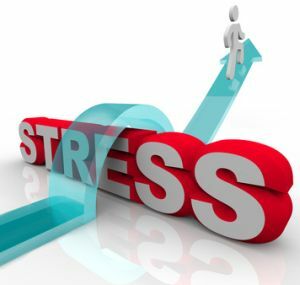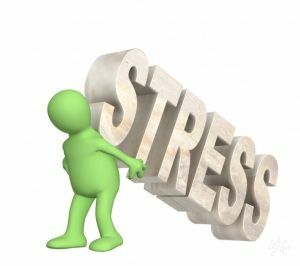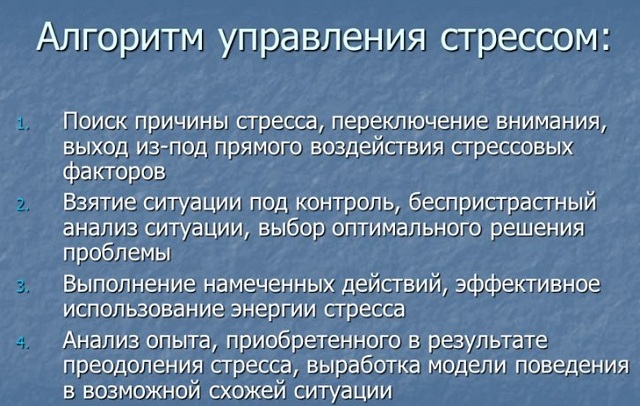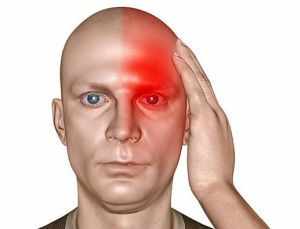 Stress is a reaction of the human body to influence from the outside( negative emotions, conflicts, problems, scandals), as well as nervous overstrain, inner experiences.
Stress is a reaction of the human body to influence from the outside( negative emotions, conflicts, problems, scandals), as well as nervous overstrain, inner experiences.
During stress in the body, the hormone adrenaline is released. A small amount of adrenaline helps us to activate the body's resources to perform everyday tasks, speeds up the thinking process, helps to concentrate on the performance of the work.
Excessive release of adrenaline may have a detrimental effect on health, making the body weaker and prone to disease.
Stress is divided into positive( eustress) and negative( distress).When eustresses, internal human resources are trained and activated, immunity increases. Distress is a prolonged condition, chronic and stagnant. With him, there is a depressed state, fatigue, psychosomatic diseases.
Contents
- Face the problem
- Unhealthy ways, or so it's not worth doing
- How can you really curb stress?
- Avoiding stressful situations
- Changing the situation
- Adapting to the situation
- Adopting and realizing
- Spending time on recreation and entertainment
- Healthy lifestyle
Turn around to face the
problem Signs that can help determine the body's being in a state of stress:
- sleep disturbances( insomnia,nightmares);
- constant irritation, depression;

- headaches, apathy, physical weakness;
- memory problems, with the thought process;
- diffuse attention;
- apathetic attitude towards oneself and close ones;
- absence, or unnatural increase in appetite;
- nervous tic, obsessive habits( gnaw nails, biting lips);
- increased tearfulness, anguish, a feeling of self-pity.
There are many techniques to cope with stress. However, it is not always possible to completely overcome stress, or to get out of a stressful situation. There is a risk that chronic stress can be transformed into depression, which will require treatment by a therapist doctor.
To avoid this, it is necessary to engage in self-education, developing willpower, and also use methods of stress management.
There are healthy and unhealthy( unproductive) methods of managing stress.
Unhealthy methods, or so it is not necessary to do
Unproductive methods help to temporarily reduce the level of stress, but they are quite harmful and destructive, do not require work on themselves, over the situation.
These methods include:
- smoking;
- alcohol abuse;
- drug use;
- self-isolation;
- a long view of the TV, or prolonged use of the computer is not for work or educational purposes;
- excessive eating, or malnutrition;
- too long sleep;
- relaxation with tablets, medications;
- adjournment of cases;
- inventing superfluous affairs and duties in fear to face depression, having got free time.
How can you really curb stress?
 There are several healthy ways to manage stress and exit from conflict situations. Their common feature is that they all require making changes - either in a situation that causes stress, or in your attitude and reaction to this situation.
There are several healthy ways to manage stress and exit from conflict situations. Their common feature is that they all require making changes - either in a situation that causes stress, or in your attitude and reaction to this situation.
There is no single method of managing stress, because each individual reaction is different from the reaction of the other. In order to choose the appropriate method, it is necessary to test different ways and directions of the problem solution. The most effective technique will give a sense of self-control and calmness.
Stress management includes two directions, which, in turn, have two tactics of action.
Altering a stressful situation:
- avoidance of stress;
- situation change.
Changing the response to a stressful situation:
- adapting to the situation;
- acceptance of the situation.

Based on these areas and tactics, six effective ways to control stress can be identified.
Avoidance of stressful situations
It is not possible to avoid all stressful situations. Many situations, one way or another, require a solution, and this way this method is not healthy. However, some situations can and should be avoided:
- Be able to say "no" .It is necessary to know yourself well and your limits and boundaries, adhere to them firmly. Refuse from unnecessary duties, work, responsibility, if they exceed your level of competence, or if their performance is impossible. This applies to both personal and professional activities.
- Protect yourself from people who cause you negative .In the event that there is a person in your environment who causes you a stressful situation, and this situation can not be resolved, then it is necessary to restrict communication with this person or completely exclude his presence in your life.
- Control the environment around you .Turn off the TV if you are not satisfied with the quality of the TV programs, change the route of the trip to work, if there are traffic jams, change the store where you make purchases, if you are not satisfied with the quality of service.
- Do not support the conversation on an unpleasant topic .Do not take part in the conversations, the content of which is frustrating, annoying. Make it clear to the interlocutors that you do not want to participate in the discussion.
- Shorten the list of current affairs of .Analyze your schedule, list of duties, tasks. If the number of cases exceeds the time resources, then distribute the cases according to their importance, and if possible, refuse to perform the least important cases.
Changing the situation
If a stressful situation can not be avoided, you must try to change it. Analyze ways of changing the situation, as well as ways to avoid it in the future. Often this may require changes in communication or work: 
- Express your thoughts and feelings .When there are no obvious resentments and emotions, there is a risk that the situation will subsequently worsen, and an emotional explosion may occur. Communicate your feelings calmly, respectfully and openly.
- Go to the compromise .Be ready to change if you expect changes from others. This path is the most robust.
- Be pushy .Prioritize, and pay attention to the most important things. If something interferes with the fulfillment of the primary tasks, then eliminate and prevent these problems.
- Control the time of the .Great stress can arise from the inability to control time: late, behind schedule. All this introduces anxiety and irritation. Proper timing can reduce stress.
Adapting to the situation
If the situation can not be changed, then you can change yourself and your attitude towards it:
- Look at the problems on the other side of the .Try to look at the situation from a different, more positive side. In many
 stressful situations, one can find a positive side.
stressful situations, one can find a positive side. - Evaluate the whole situation , analyze its significance, and the need for experiences about it. In case the problem is of little importance, then switch to more important matters.
- Revise your standards. Try not to be a perfectionist, do not put yourself too high a bar. It is impossible to be perfect in everything. Ask reasonable requirements for yourself and others.
- Keep positive things in the center of your attention .Think often about the most important and valuable things for you, about the positive qualities of close people, and about your own. Negative thoughts can cause a stressful reaction in the body.
Acceptance and awareness of
Some stressful situations can not be avoided: death of loved ones, illnesses, crisis, catastrophe. Under such a situation, it would be most rational to accept the circumstances as they are, since they are beyond our control:
- Do not try to control what is not controlled by the .Think about things that you can control. Think over your reactions to the problem.
- Look further and wider .In a stressful situation, seek the potential for personal growth. Also analyze what your words and actions could lead to such a situation.
- Share your experiences .Tell us about your feelings. This is unlikely to help solve the problem, but after that there may be some relief.
- Learn to forgive .All people make mistakes, there are no ideal people. Do not keep resentment and anger.
Allocate time for rest and entertainment
You can control and reduce stress levels with the help of rest and entertainment. This can increase the stress resistance: 
- Allocate time to rest .You have to rest every day. This will help you gain new strength and energy.
- Communication with people .Surround yourself with people with a positive attitude to life that support you.
- Hobby .Take time to practice your favorite business.
- Sense of humor .You need to keep a sense of humor and the ability to laugh at yourself. Laughter helps fight stress.
Healthy lifestyle
Strengthening the body and health will lead to an increase in stress resistance:
- Regular sport activities .Reduce and prevent the effects of stress can be through physical activity. The most suitable for this aerobic exercise.
- Healthy food .With the help of healthy food, you can increase the body's resistance to stressful situations.
- Restrict the consumption of sugar and caffeine .These products raise energy to the maximum level, after which there is a decline. With minimal consumption of sugar and caffeine, you will be more relaxed, and notice an improvement in the quality of sleep.
- Refusal of alcoholic beverages, cigarettes, drugs .They give a false sense of relief, while negatively affecting physical and mental health.



